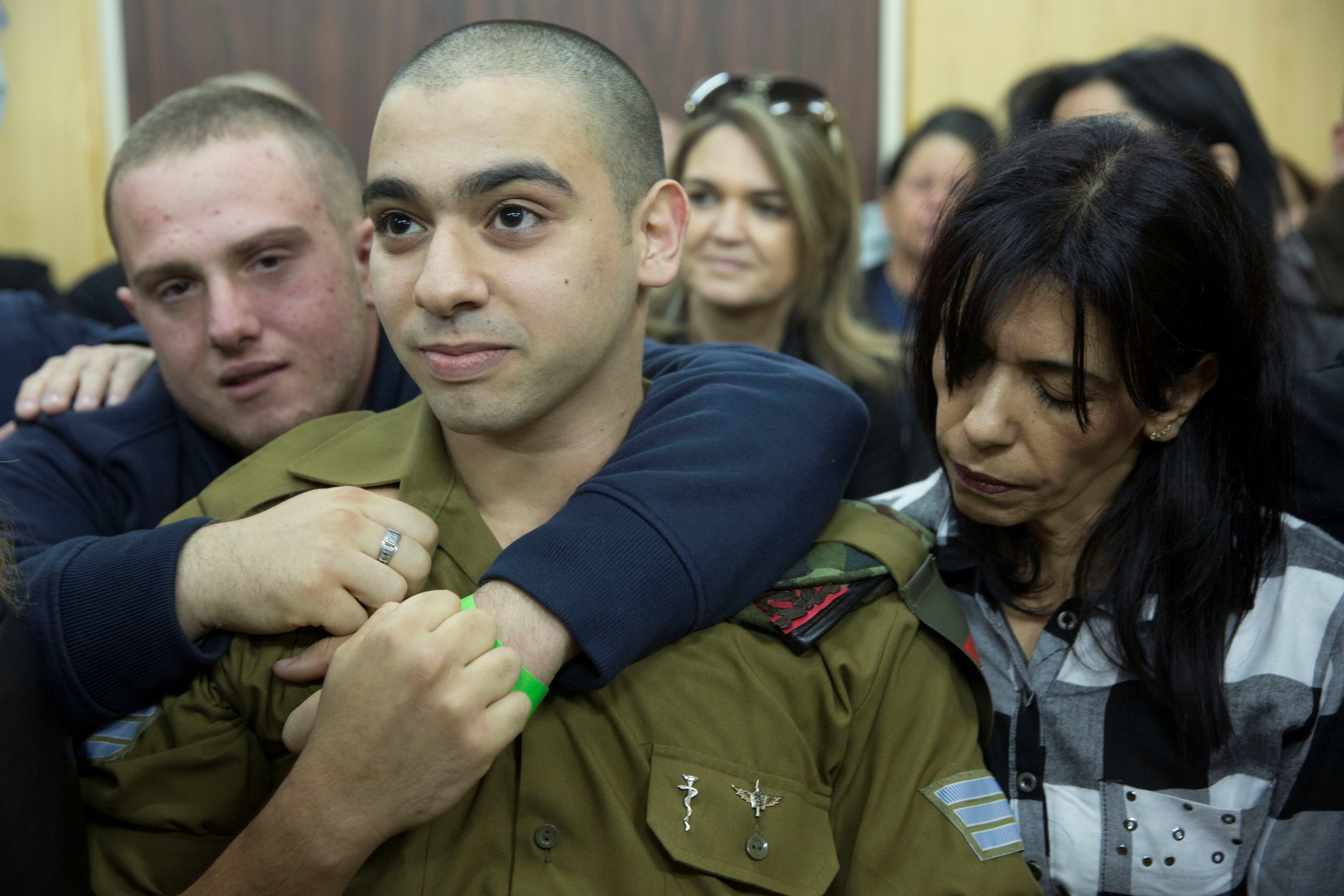
Starting at 9 a.m. on Wednesday, Israeli TV networks canceled their regular broadcasting to cover the delivery of the verdict in the military trial of Sergeant Elor Azaria.
At 12:30 p.m., after the lead judge had been reading the verdict for two and half hours, the court found Azaria guilty on all counts. This is first time in 11 years that an Israeli soldier has been found guilty of manslaughter.
Azaria was accused of killing a Palestinian attacker who staged a knifing attack on a group of soldiers in Hebron on March 24 and who had already been shot and neutralized.
The case gained prominent and immediate attention, after the organization B'Tzelem released a video showing the killing, and Israeli officials—including then–Defense Minister, Moshe "Bogi" Yaalon, as well as the Israeli Defense Forces Chief of Staff Gadi Eizenkot—stated that this was not how a soldier in the IDF is expected to act.
Initially, Prime Minister Benjamin Netanyahu said something similar. However, when right-wing politicians spoke out supporting Azaria—asserting the soldier did nothing wrong—Netanyahu switched his position and began making statements in support of the Azaria and his family.
That switch resulted in a confrontation between Yaalon and Netanyahu, which led to Yaalon ending his service as defense minister, and being replaced MK Avigdor Lieberman, who had been one of the first to run to Azaria's defense, attending his arraignment hearing in military court.
Related: Tel Aviv Diary: Obama exacts cold revenge on Netanyahu
For months, the Israeli public has been arguing about whether Azaria should have been charged. That argument has taken place on two levels: the first, factual, i.e., clarifying what actually took place; and the second, questioning whether there is anything wrong with killing a wounded terrorist.
Widespread sentiment on this matter can best be summed up by what a taxi driver said on the morning of the verdict—"Who cares if Azaria did it or not! He was a terrorist who should be killed."
In a country that has been fighting terror, of one kind or another, for more than 60 years, the feeling expressed by the taxi driver is very understandable and represents the perspective of many.
Nevertheless, that was not the view the military court accepted, stating as part of the verdict that a life—even that of terrorist—is a life, and once he has been neutralized and no longer presents a danger, then killing him constituted a crime.
The court dismissed all of the various defenses Azaria's attorneys presented—everything from the claim the attacker was dead already, to the assertion Azaria was afraid for his life and feared the attacker had a bomb.
The judges gave the greatest credibility to the testimony of one of Azaria's friends whom the soldier told that the attacker "had to die, since he tried to kill his friends."
In addition, judges also attacked the defense for claiming the military chain of command—who had all reported the fact that there was no danger to Azaria's life and that he had arrived on the scene long after the terrorist had been shot—had somehow been lying for political reasons.
As the verdict was being read, a raucous demonstration was taking place across the street from the court in support of Azaria. Four Azaria supporters were arrested after the demonstrators blocked one of Tel Aviv's main roads. Referring to IDF Chief of Staff Gadi Eizenkot, demonstrators were heard shouting, "Gadi, Gadi, be careful. Rabin is looking for a friend." (The Israeli prime minister Yitzhak Rabin was assassinated in 1995.)
Lieberman spoke to the media and said that although he does not like the court's verdict, he respects it, and he called on all the other politicians to do the same and stop attacking the IDF chief of staff.
Lieberman's call for respect and restraint was not heeded by Education Minister and head of the right-wing Bayit Hayehudi party, Naftali Bennett, who stated: "Today the soldier, who killed a terrorist who deserved to die and who tried to slaughter a soldier, was put in handcuffs and found guilty. We need to say the truth. The process was contaminated from the beginning."
Meanwhile, the deputy foreign minister, Tzipi Hotoveli, a member of the Likud, Netanyahu's ruling party, stated: "Azaria's military trial was a show trial with a predetermined end."
In contrast, Amir Peretz, a former defense minister who is running once again to become head of the Labor Party, stated: "This is not a day for cheering. I call on everyone to respect the court ruling. Its independence and authority is part of the army's resilience and moral standing."
After the announcement of the Azaria verdict, feelings on the streets of Tel Aviv were clearly mixed. There was undoubtedly a tremendous amount of sympathy for Azaria and his family. He was sent to serve in a place that is full of contradictions, and he was not equipped to deal with it. Now, he is paying the price.
A young veteran who served in the West Bank a year ago responded to the verdict by saying:
"The pressure serving in the West Bank is like no other border in Israel. If we fail, soldiers and civilians die. But our success is usually at the expense of Palestinians.
"There is a direct relationship between the fear felt by soldiers and their inclination to act without thinking. However, Azaria is unlike those situations because the terrorist no longer posed a threat, there were many soldiers and high ranked commanders around the two terrorists bodies and it seemed like Azaria thought about it beforehand."
To many, there was a sense that the army had done what it had to do—i.e., to unequivocally state that IDF ethics do not condone the killing of anyone who is no longer a threat and that when our ethical rules are violated there is a price to be paid.
MK Shelly Yachimovich, a former leader of the Labor Party, summed it up best, perhaps, when she issued a statement saying:
It is good that the trial came to the verdict that it did. However, now may be the time to think about a pardon as one lone young soldier cannot carry all the burdens of the fissures that exist in Israeli society.
Marc Schulman is the editor of HistoryCentral.com.
Uncommon Knowledge
Newsweek is committed to challenging conventional wisdom and finding connections in the search for common ground.
Newsweek is committed to challenging conventional wisdom and finding connections in the search for common ground.
About the writer
To read how Newsweek uses AI as a newsroom tool, Click here.








